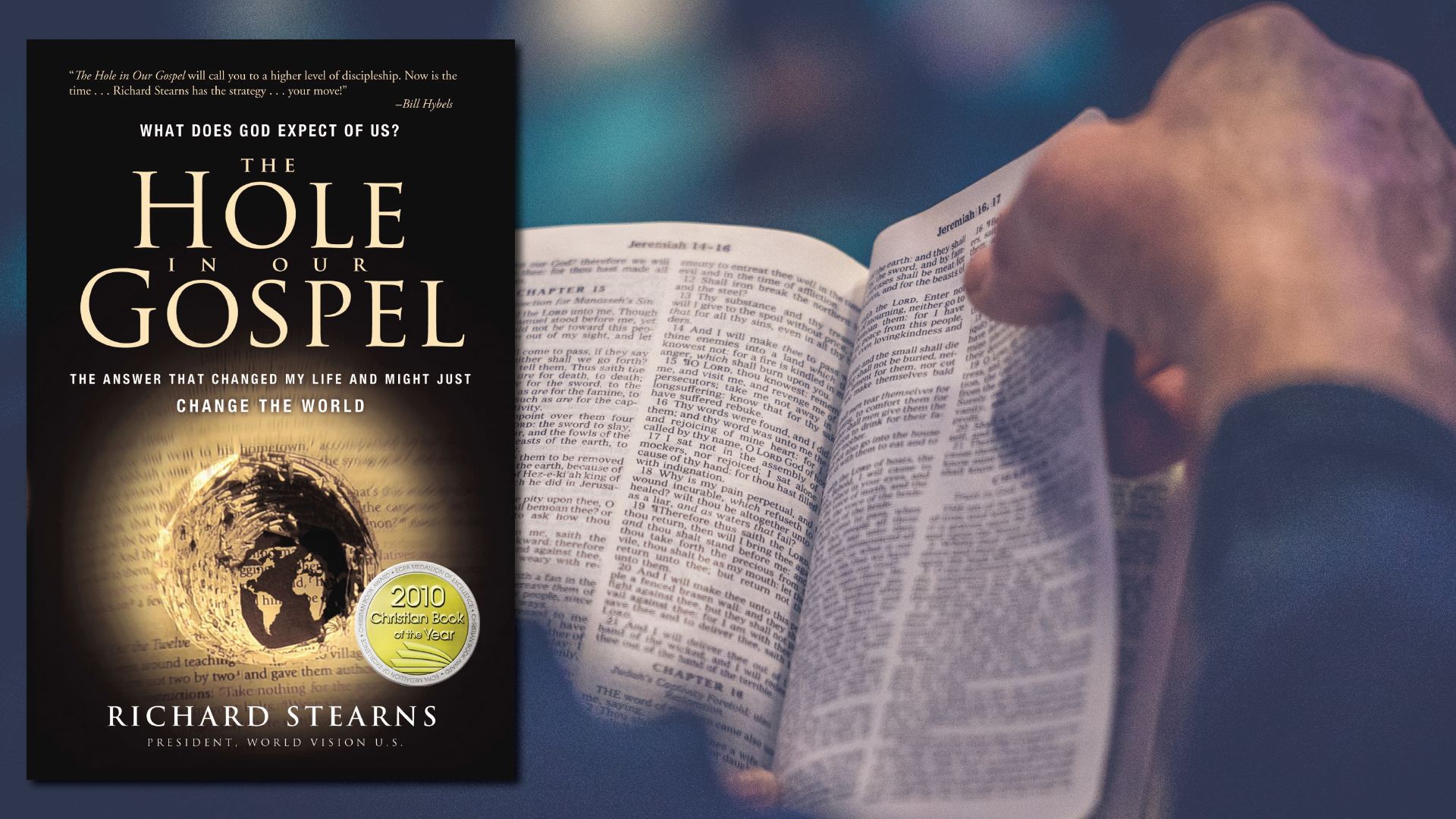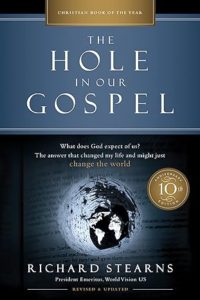A Holy Worldview, or a Hole-y One? An Overview of the book The Hole in Our Gospel
Savannah Aleckson
Events Director/Adjunct Instructor
Read more from Savannah
Jump to:
The Perspective | The Purpose of the Book | The Key Points | Details We Love | Considerations | Who Should Read This?
The Hole in our Gospel is written by Richard Stearns, President Emeritus of World Vision, one of the largest international relief and development nonprofits in the United States. Rich first shares his own “rags to riches” story: Despite his impoverished and dysfunctional childhood household, Rich attended an Ivy League school and climbed the corporate ladder, eventually landing the CEO position at a luxury tableware company. Vulnerably, Rich shares his initial reluctance to leave the corporate world to join World Vision: He had grown accustomed to the cushy lifestyle afforded to him and his family through his position. However, Rich eventually submitted to the direction He felt the Lord nudging him in and changed career paths in an effort to help the global poor. That decision, and the experiences he had in the years following, led to strong convictions about the Church’s unique role in caring for the impoverished, which he shares about in this book.
Rich asserts that the message of the Bible can be summed up in this way: love God, love your neighbor. However, he claims in The Hole in our Gospel that many American Christians have adopted a watered-down version of the Good News (hence the title of the book) that is personal only, with no redemptive vision for the broken world around. Because of this misunderstanding, the American Church is currently falling short in its God-given task to “love thy neighbor.” Rich aims to correct this misunderstanding and open the eyes of the Church to the plight of the global poor and petition them for sacrificial action.
Christians bear a responsibility to radically love the widow, the orphan, the hungry, and the hurting.
Rich notes God’s heart for the poor and His disgust with religious people who are apathetic to their plight, as demonstrated in scripture. He also points to scripture’s clear mandate to love others in word and deed and laments that Christians appear to be largely failing at this: He cites the fact that American Christians hold 50% of the global Christian wealth while only making up 5% of the global Christian population. Despite this astounding wealth available to us, the average giving of American church-goers is at an abysmal 2.17% of total income; and giving trends indicate that, as our wealth has grown, Christian giving to the Church and to nonprofit ministries has dwindled. Rich compels his Christian readers to ask the Lord to align our hearts with His and act accordingly, loving the poor in highly personal, sacrificial ways.
There are global issues of poverty that present opportunities for impact.
Rich spends a good deal of this book illuminating the most grinding poverty afflicting various parts of our world today, and the grave implications that those issues of extreme poverty have if left unaddressed. For example, Rich cites the fact that more than 3 million children under the age of five die from issues of undernutrition every year; nearly 3 million people die from malaria, tuberculosis, and AIDS every year; and 700 children die every day from illnesses contracted from drinking dirty water. Though these are grim statistics, Rich ultimately takes an optimistic stance, seeing these realities as opportunities for the Church to have incredible impact by alleviating great suffering.
We must see all our resources from a Kingdom perspective.
Specifically, Rich focuses on three resources: our time, our talent, and our treasure. The emphasis is that God cares about willingness and availability. Even if we don’t have much in the way of resources, God can use what we give Him in a multiplicative way; it only requires that we submit to Him the resources that have been entrusted to us through radical generosity. He shares several such stories about radical generosity, including a young boy who raised millions of dollars for AIDS victims by shooting free throws and an impoverished woman who pinched pennies for many years in order to make a $1,000 donation to World Vision. Rich notes in all these inspiring stories that willingness is the essential ingredient that resulted in a difference made.
Perhaps the biggest takeaway from The Hole in our Gospel is that the Church needs to step up its game in bold, sacrificial love for our neighbors—even neighbors across the world. We applaud Rich’s clarion call to the Church to be salt and light in a world that desperately needs those, and we wholeheartedly agree that the Church ought to be on the frontlines of addressing social ills in personal, sacrificial ways. Rich’s humility in accepting his past failure to boldly love his poor neighbor allows this message to be gentle yet firm, with no condescension or judgment.
Furthermore, we love Rich’s heart for personal, relational action that sees every person as a valuable creation made in God’s image. At a couple of points in his book, he shares some related guiding principles for poverty-fighting that are spot on. As we engage people experiencing poverty, we must remember the following:
- Every one of these hurting people is created in God’s image and loved by Him.
- Every one of these challenges has a solution.
- Every one of us can make a difference.
These are timely reminders for those who may feel overwhelmed by the enormity of the problems of poverty or who feel unmoved by the plight of the poor: that we each have a role to play in the necessary, attainable progress to help our suffering fellow man.
We also appreciate Rich’s acknowledgment of the complexity of poverty. Especially when it comes to extreme poverty across the globe, it can be tempting to think that relief interventions alone are what’s needed: providing clean water, nourishing food, and sufficient housing to those who need it. While Rich acknowledges that relief may be immediately necessary for those who are in desperate and dangerous circumstances, he also is clear that poverty is complex and requires developmental solutions, even in (or especially in!) situations of extreme poverty. He is careful to note that those in absolute poverty are also made in the image of God and, therefore, have giftings, skills, and capacities that ought to be put to use. Rich puts the focus on creating contexts in which those capacities can be utilized to create flourishing, which we applaud.
At a couple of points within the book, Rich appears to be making the argument that wealth is a zero-sum game. For example, he seems to give tacit approval of former President Jimmy Carter’s diagnosis of poverty: that the main driver behind poverty is the growing disparity between the wealthy and the poor, as the “rich get richer and the poor get poorer.” In other places throughout the book, however, Rich supports the idea that wealth is a tool and not inherently evil, as well as the idea that poverty is complex and not easily diagnosed, but this passage taken in isolation can be troubling. It’s important to remember that wealth, earned legally and ethically, is not the problem that needs solving. Rather than pinning the problem on the gap between wealthy and poor, we advocate the Church focus on solutions to poverty and search for on-ramps for the poor to join the wealth-creation process.
The Hole in our Gospel is, first and foremost, for Christian audiences. More specifically, this is a great read for anyone who has a particular interest in global poverty. If the reader desires a firmer grasp on issues of extreme poverty and the needed interventions, this is the book for you.
The Hole in our Gospel can be purchased at Amazon. If you purchase the book through this link, True Charity will earn a small amount as an Amazon Associate
This article is just the tip of the iceberg for the practical resources available through the True Charity Network. Check out all of the ways the network can help you learn, connect, and influence here.
Already a member? Access your resources in the member portal.





